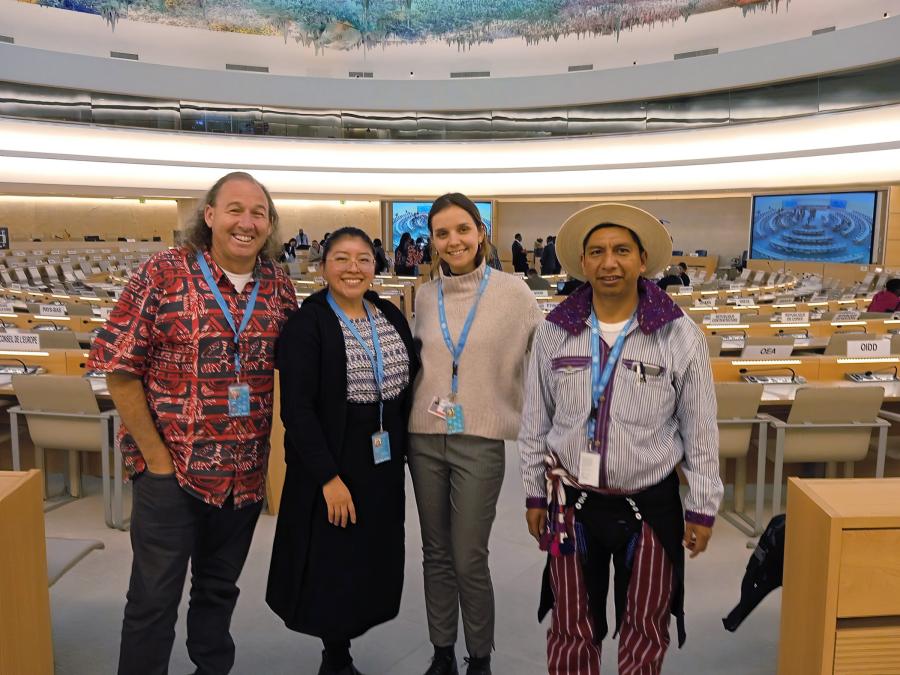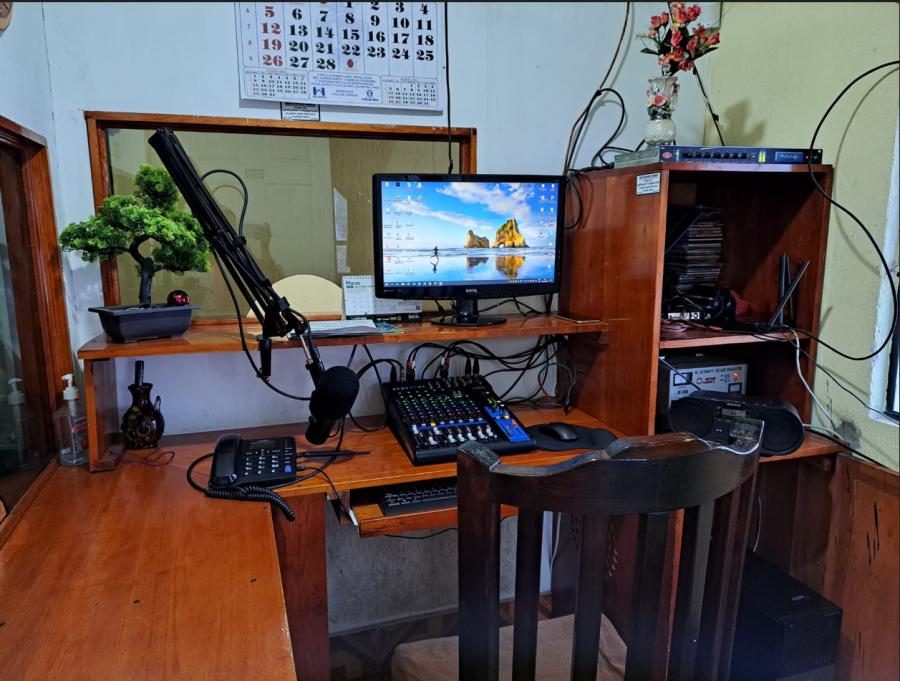The civil patrol system, which the Guatemalan Army established as the cornerstone of its rural counter-insurgency campaign in late 1981 and 1982, is the dominant institutional legacy of the violence in northern Huehuetenango. Generally accepted by the people who are patrols, the civil patrol system serves other functions than the army claims. While perhaps started as a means of suppressing the guerrilla movement, it has instead become a way of controlling the local indigenous population.
As one travels the road north and eastward out of Huehuetenango into the Indian hill country, there are over 15 checkpoints between the departmental capital and the frontier town of Santa Cruz Barillas. Each of these checkpoints is manned by about six members of the local civil patrol unit, who are armed with old rifles, shotguns and pistols supplied by the army. A roadblock exists at each checkpoint and the civil patrol members are supposed to stop all passing vehicles, check the papers of travellers and inquire about the purposes of their trips. In all of the towns, there are also small army bases which were built at the height of the civil strife but, at present, army units are only stationed in the towns of Santa Eulalia and San Mateo Ixtatán.
The civil patrol system reportedly includes over 900,000 men throughout the country. All able-bodied men between the ages of 18 and 60 are expected to spend one 24-hour period every eight or 15 days guarding the village or township population from guerrilla intrusions. Patrol duty, which the army claims is voluntary, is supposed to maintain local peace and security by insuring that "subversive" elements do not again gain a foothold in the countryside.
Indians' View of Patrol Mixed
Most of the Indians to whom I talked had a mixed opinion of the civil patrol system. On the one hand, most people felt that the civil patrol system is useful because it provides the local population with some degree of security and tranquility after a period of intense chaos and civil strife. On the other hand, people also told me that participation in the civil patrol system is a heavy burden, which takes time away from their other agricultural and commercial activities, particularly during a period when economic conditions are worsening in the countryside. In many of the Indian towns, people wonder how long they will need to maintain the civil patrol system, especially in the highland areas where there no longer seems to be a guerrilla threat.
Patrol Duty Forced
The army introduced the civil patrol system in this region by asking the local political bosses with whom they had contact to form the civil patrol units in each Indian township. These political bosses, either to protect their own local Indian followings from army massacres or because they genuinely opposed the guerrilla movement, tended to cooperate with the army. At the same time, they followed the army's orders and sent their people out to inform upon or capture those people who were believed to be guerrillas or guerrilla sympathizers. Many people, for example, told me stories about how in the early months of the formation of the civil patrols, they were forced to go on rastreos (guerrilla searches) and to stone or machete to death their fellow villagers who were suspected or accused of being "subversives."
From my conversations with people in the Kanjobal region, I sensed that many of them had internalized a large amount of guilt and shame as a result of their participation in the civil patrol system. Such guilt was aroused because the army entered the Indian towns as if it were an angry father and accused the Indians of being rebellious children responsible for the civil damage and strife the guerrilla movement created. Formation of the civil patrols, I believe, was presented to the Indian population as a way of extricating themselves from any association with the guerrilla movement. It was also a way of insuring that the army's wrath, in the form of village massacres, did not continue to fall upon the Indian population. By agreeing to participate in the civil patrol system, Indians were able to protect themselves against future acts of systematic violence by both the army and the guerrilla movement. They did so, however, at the cost of enormous personal sacrifice and collective guilt.
There is little doubt that there was enormous pressure by both the army and the local political bosses to pressure all able-bodied men to participate in the civil patrol system. Most people I talked to looked at me in dismay when I asked whether participation in the civil patrol system was voluntary in their village or town. Many people also told me that people who refuse to participate in or try to escape from civil patrol duty and are caught by the local authorities are placed in a meter-deep well (which are called pozos de agua) or pit (hoyo) near local army bases or in the municipal jail in each of the Indian towns. If people strongly protest civil patrol duty, they may also be accused of being "subversives" and sent to the army base in Huehuetenango for punishment.
Patrol's Authority Abused
There is also little doubt that the civil patrol system in this region is being used to settle petty family or community disputes; its authority and power are greatly abused. Some informants told me about cases where disputes between different religious or political factions in villages, or between Indians and ladinos, were settled by the intervention of the civil patrol units, either alone or under the advice of local military commanders. A case in point took place in a village in Santa Cruz, Barillas earlier this year, when three ladino members of the local civil patrol beat up an Indian man and raped his wife, because they wanted his land. Despite the order by a Huehuetenango judge that the civil patrol members be brought to trial for these actions, the local military commander in Barillas set them free after only twenty-two days in jail. The Indian man who was beaten by them was forced to go into hiding in order to protect his life.
Last year, there were also several instances where the civil patrol in a village in San Mateo Ixtatán sent persons accused of being "subversives" to the military base at Ixquisis where they disappeared or were later found dead. Although the village is located in a Chuj-speaking township, many of its residents are Kanjobal-speaking people who were greatly affected by the violence and sought refuge by escaping to Mexico or the United States. The head of the civil patrol in this village, who is a catechist, had taken advantage of his authority to inform on people who cooperated with the guerrillas, despite the fact that these people have come forward under the amnesty announced by the government. One Kanjobal man, who spent eight months in the United States, was sent to the army base in Ixquisis in December 1984 by the local civil patrol commander, and has not been heard from since.
In certain townships there is some evidence the civil patrol system is being used as a source of economic corruption and personal gain. It is common knowledge that one can pay for someone to take one's place on civil patrol duty and that one needs to pay for the days that one is absent from civil patrol duty, if one leaves the township to work for any length of time and does not arrange for a person to take one's place. As I understand it, the money that one pays to cover one's absence goes to the local civil patrol or military commander, rather than into the municipal treasury or some other communal fund. In a system where bribery (mordida or "bite" in Spanish) is customary with all public authorities, such practices of paying money to get out of civil patrol duty can obviously lead to abuse.
Patrol Replaces Judicial System
In general, it is very difficult to obtain details about local abuses of power because people are afraid to step forward and use the national judicial system to denounce them. The civil patrol system, in fact, has replaced the national judicial system as an institution for resolving local conflicts and disputes. In the past, people would go before the local mayor, who served as a judge or to the departmental judge in Huehuetenango to settle their differences or to denounce a personal damage or crime. Today the local civil patrol commander or the local or regional military commander often resolves these disputes through violence.
The most striking feature of the civil patrol system is that it is being used as a means of surveillance to check the papers of local residents, to monitor their movements, and to insure their allegiance to the "New Order" that the military has created. Relative order and tranquility have been restored in most of the highland Indian towns, but at the price of the establishment of a new institution which now monitors and controls nearly every aspect of Indian life.
Article copyright Cultural Survival, Inc.


